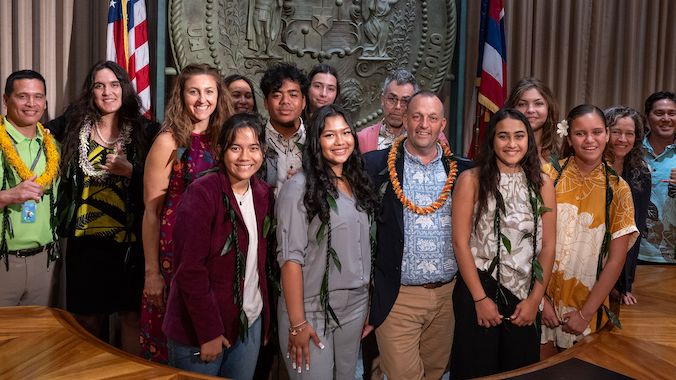Hawai’i Settles Youth Climate Lawsuit, Acknowledging a Right to a Clean Environment
Photo by Robin Loznak/ZUMA Press Wire/Shutterstock
In a historic first, the state of Hawai’i agreed to a settlement with a group of young plaintiffs who had sued the state government over a failure to decarbonize its transportation sector. The settlement, announced on Thursday at a joint press conference with the plaintiffs and state officials including governor Josh Green, explicitly acknowledges the right to “a clean and healthful environment” and agrees to implement a plan toward zeroing out transportation carbon emissions by 2045.
“I am so proud of all the hard work to get us to this historic moment,” said Navahine F., one of the young plaintiffs in the case, in a press release from Our Children’s Trust and Earthjustice. “We got what we came for, and we got it faster than we expected.”
The lawsuit was filed in 2022 by 13 young Hawaiians. It relied on a provision of the state constitution which reads: “Each person has the right to a clean and healthful environment, as defined by laws relating to environmental quality, including control of pollution and conservation, protection and enhancement of natural resources.” The case was set to go to trial on Monday, and would have become the second youth-led climate case to reach a courtroom following on Held v. Montana last year; the young plaintiffs won that case thanks to a similar state constitution provision, and the government may now be compelled to address its emissions.
“The passion demonstrated by these young people in advocating for a healthy, sustainable future for their generation and those to come, is laudable,” Governor Green said. “This settlement informs how we as a state can best move forward to achieve life-sustaining goals and further, we can surely expect to see these and other youth in Hawaiʻi continue to step up to build the type of future they desire.”
The move is a marked departure from the dozens of other youth-led cases that are still winding their way through court systems in all 50 states. In no other case has the government yet shown a willingness to work with the plaintiffs rather than against them; a co-counsel for the plaintiffs said the settlement offers a “holistic roadmap” for other governments to follow. The Montana precedent suggests that states with clean environment provisions in their constitutions may do better to settle, though many states lack such a clause; youth lawsuit prospects in those states remain more muddled.
Hawai’i will have one year to create a greenhouse gas reduction plan for the state’s transportation sector, including interisland travel. The agreement also establishes a volunteer youth advisory group that will work with the transportation department on the decarbonization efforts, and allocates $40 million to expand electric vehicle charging infrastructure by 2030.
“Being heard and moving forward in unity with the State to combat climate change is incredibly gratifying, and empowering,” said Riley Brooke K., another youth plaintiff. “This partnership marks a pivotal step towards preserving Hawai‘i for future generations — one that will have a ripple effect on the world. I hope our case inspires youth to always use their voices to hold leaders accountable for the future they will inherit.”